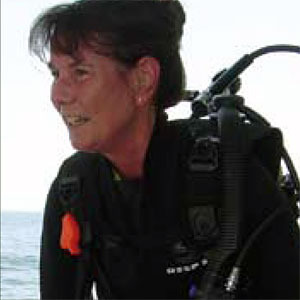Nancy N. Rabalais2009 Presenters

Nancy N. Rabalais
Nancy N. Rabalais, Ph.D., executive director and professor, Louisiana Universities Marine Consortium (LUMCON), Chauvin, La., and professor, Department of Oceanography and Coastal Sciences, Louisiana State University, Baton Rouge
“There are more and more people trying to reduce their carbon footprint. That is the mantra of the day with regard to global warming. But there's also a nitrogen footprint that has a more immediate effect on our daily lives – in terms of water quality, food availability, sustainable agriculture, and daily subsistence. While our carbon footprint is making a not so immediate, but profound mark on the existence of human life on the Earth’s ecosystem, the nitrogen footprint is there, lurking in the background, with an equal potential to disturb the balance of a global ecosystem.”
Nancy Rabalais has spent more than two decades studying the Mississippi River and the damage agricultural run-off and other human activity has caused. She has been instrumental in bringing national attention to the problem of hypoxia (i.e., oxygen-depleted waters) in the Gulf of Mexico resulting in large part from nutrients—particularly nitrogen—carried to the gulf from the Upper Mississippi River Basin. As a result, a Mississippi River/Gulf of Mexico Watershed Nutrient Task Force of federal, state, and tribal members , led by the U.S. Environmental Protection Agency, developed and is now implementing a Gulf Hypoxia Action Plan to coordinate and support nutrient management and hypoxia-related activities in the watershed and the gulf.
Rabalais attended Texas A & I University at Kingsville, where she earned both a B.S. (1972) and an M.S. (1975) in biology, with an emphasis on marine science. Her first professional position was as a naturalist at Padre Island National Seashore, but her marine training soon led her to research in the environmental impact of offshore oil and gas exploration and development. After receiving her Ph.D. from the University of Texas at Austin in 1983, she joined the Louisiana Universities Marine Consortium (LUMCON) to continue her research. A grant from the National Oceanographic and Atmospheric Administration (NOAA) secured by the then-director of LUMCON, Donald Boesch, turned Rabalais’s focus to investigating the long-term environmental changes offshore associated with changes in the Mississippi River. She was named professor at LUMCON in 1988 and executive director in 2005 (shortly before Hurricane Katrina hit).
Read a more detailed Nobel Conference profile of Dr. Rabalais written by freelance science writer A.J.S. Rayl.
TOPIC: Dr. Rabalais will show how actions far away in a watershed are having direct effects on coastal ecosystems, including noxious and potentially harmful algal blooms, “dead zones,” threats to coastal fisheries resources, loss of biodiversity, and loss of ecosystem services, and what actions can be taken to restore a balance. She will also discuss how individual, societal, and political institutions can bring about effective change.